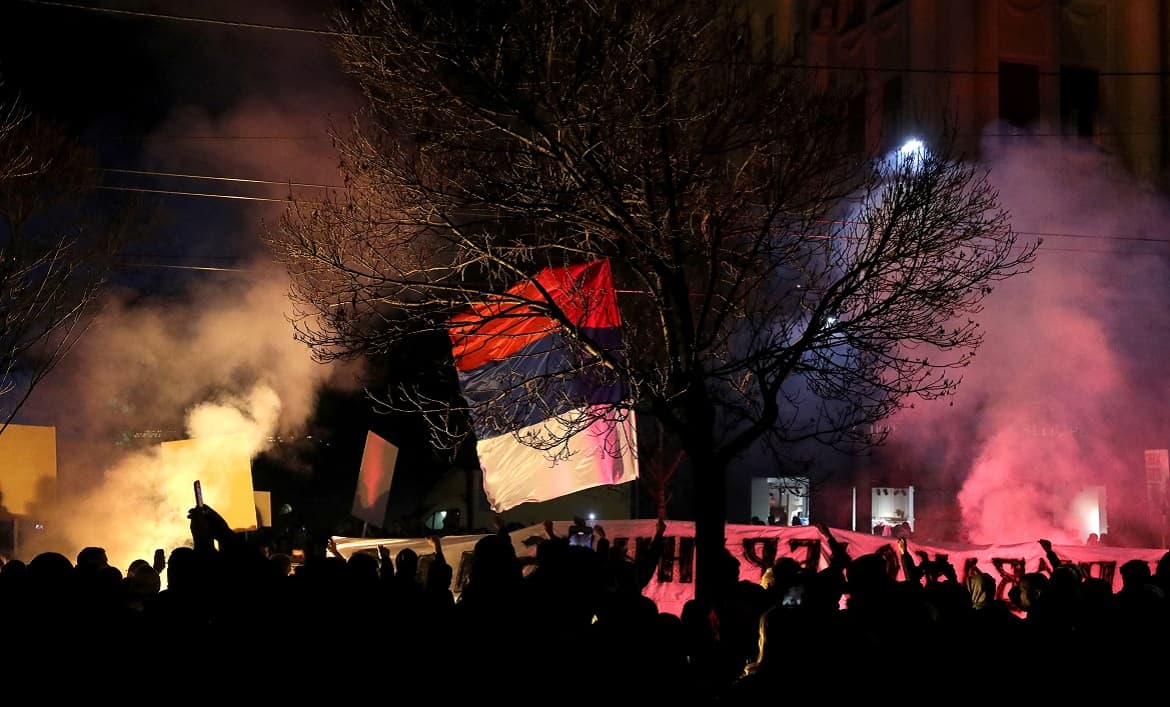Serbs often overestimate Western political technologists — probably as a consequence of our national failures of the 1990s and the traumas connected to them. And collective traumas, it should never be forgotten, are an important instrument in every cognitive war. That Western political technologists are far less inventive than is usually believed in Serbia is confirmed by the content of the latest Resolution of the European Parliament. However, this lack of imagination certainly does not stem from ignorance, but from arrogance and conceit — traits particularly characteristic of those worn-out actors whose power, after decades of hegemony, is rapidly fading, yet who are unwilling to face that reality. This is a law of nature that applies not only to individuals but also to human institutions.
The mentioned Resolution makes crystal clear the attitude and intentions of the European Union toward Serbia’s current serious and deep political and social crisis. In doing so, the members of the European Parliament have, in fact, done Serbia a favor, because Serbia — or more precisely, its political elite — considering the EU’s geostrategic goals in the Balkans, should in the coming days and months act in a manner opposite to the demands and expectations of the European Parliament.
INTENTIONS OF THE EUROPEAN UNION
In the long text of the European Parliament Resolution, several key points can be observed:
- It clearly shows the European Union’s intention to use the existing deep social and political crisis to increase its influence in Serbia — primarily by obtaining, through pressure and blackmail, new political concessions from the authorities, establishing oversight over the work of security services and the judiciary, and arbitrating in the political dialogue between the government and the opposition (points 3, 4, 5, 7, 13, 15, 19, and 26).
- The European Union also clearly demonstrates through this document that it seeks to use the current crisis to force Serbia to eliminate the last remnants of its multi-vector foreign policy, since it demands that the Serbian government prevent Russian propaganda — effectively calling for the shutdown of Russian media in Serbia — and introduce sanctions against the Russian Federation, which, in the initial phase, could even take the form of nationalizing Russian property (points 13 and 24).
- With this European Parliament document, Serbia is informed that there will be no further progress in EU integration — that is, no new negotiation chapters will be opened — without full alignment of Serbia’s foreign and security policy with that of the EU, as well as without new reforms in the judiciary, media, and anti-corruption sectors. In translation, this means the establishment of a judiciocracy, a quasi-police anti-corruption system and the adjustment of media narratives to the Russophobic standards of Western cancel culture (points 2, 17, and 24).
- By stating that the European Parliament “remains concerned about the presence of nationalist narratives in parts of the protest movement,” and that it “regrets the continued use of narratives such as ‘Greater Serbia’ and ‘Serbian World,’ which have in the past been promoted by certain members of the Serbian government,” and reminding that “such rhetoric has no place in EU–Serbia relations and undermines regional stability” (point 17), the European Union has clearly conveyed that advocates of the Serbian national position are not welcome on the political scene. It further implies that Serbian patriotic parties must be marginalized in Serbia, as must opponents of the country’s accession to the European Union, who, for the sake of defamation, are equated with Russian propagandists and those who openly promote violence (point 2).
OLD AND NEW INSTRUMENTS OF PRESSURE
The European Parliament does not even conceal the instruments through which the EU intends to exert pressure on the government of Serbia, to place its security services, judiciary, and media under additional supervision, and to exert decisive influence over opposition protests and the opposition in general.
First come some of the old instruments of EU influence in Serbia. These include the non-governmental sector, once again proclaimed as a key actor in Serbia’s internal political processes — with the Serbian government being urged to ensure it special protection and financial support (point 25). Then there are national minorities, which enjoy special attention and protection from the European Union (point 3).
Among the new instruments of influence and pressure, the Resolution proposes sending an ad hoc EU mission to Serbia, which would, on the ground, conduct a form of investigation in the field of repressive policy — implying supervision of the work of the police, intelligence services, prosecution, and judiciary. The mission would also deal with ongoing protests and the state of democracy, establishing contacts with the opposition, student movements, and the university (point 26). Accepting such a mission by Serbia would open a real Pandora’s box regarding internal political and electoral processes. Ultimately, the mission’s activities would lead to the further de-sovereignization of the state and the restriction of its independence.

SANCTIONS – A PEACETIME SUBSTITUTE FOR WEAPONS
The Resolution proposes that the European Commission, for the first time, apply a sanctions regime against Serbia (point 29) by introducing personal sanctions against high-ranking state officials for serious cases of human rights violations. Serbia’s experience with sanctions in the 1990s, as well as those imposed by the Collective West on, for example, Belarus, Russia, and Iran, clearly shows that sanctions are actually a peacetime substitute for weapons — and, like weapons, they serve to destroy a country and to pressure its government into adopting a puppet policy in the interests of those external actors that impose such punitive measures. Numerous wrong decisions by the current authorities cannot justify the calls by some opposition parties in Serbia for the introduction of sanctions, since Brussels uses sanctions to further reduce the maneuvering space of the current government, to extract new concessions from it, or to obtain those concessions from a new government that would have the Damoclean sword of previously imposed sanctions hanging over its head.
Given such clear and openly displayed intentions and plans of the European Union toward Serbia, the choice of the path out of the current crisis should be made in a way that prevents Brussels from achieving the aforementioned goals. This means that the country should, as soon as possible, find its own political way out of the ongoing crisis, which carries immeasurable risks — primarily because of the current difficult international circumstances, as clearly illustrated by the aforementioned Resolution of the European Parliament. Stabilization within the country can be achieved only through elections at all levels of government. In order for the election results to be accepted by all political actors, a dialogue between the government and the opposition must be initiated before the elections are called, focused on amending the existing electoral and media laws. A consensus reached on electoral and media legislation would guarantee the legitimacy of the electoral process and results. This would allow Serbia to avoid the trap of a new “October 5th” scenario that could erupt if the opposition refused to recognize election results organized under the current, largely disputed electoral and media framework.
TRANSFER OF POWER THAT GUARANTEES THE IMPLEMENTATION OF THE EU’S GEOSTRATEGIC GOALS
Through the latest Resolution of the European Parliament, the European Union clearly demonstrates its intention to marginalize patriotic political forces on Serbia’s political scene in order to secure a transfer of power that will not only preserve the geopolitical and geo-economic gains the Collective West has achieved in Serbia over the past 25 years, but also ensure that the unrealized geostrategic objectives are implemented within the first few months of the new government’s term.
Given this, general elections in Serbia must not be reduced to a choice between “two blocs,” since such binarity poses the least risk to the interests of the Collective West in Serbia while simultaneously producing a government that lacks representativeness in relation to the majority political views of the Serbian electorate. Because of its lack of representativeness, such a government would compensate for its weak domestic legitimacy by seeking external support — primarily from the European Union, as the most present and influential international actor in Serbia (along with the United Kingdom).
To achieve a representative government with strong internal legitimacy, elections should include as many political actors as possible — representing the diverse political and ideological positions within the Serbian electorate. Such representativeness cannot be achieved through “two-bloc” elections, which presuppose two large, politically and ideologically heterogeneous coalitions — especially on the opposition side — in which major issues on which coalition partners disagree are swept “under the rug.” In this way, voters are effectively deceived, as they cast their ballots for overly simplified electoral platforms of large coalitions, allowing the election winners to have almost free rein to pursue whatever policies they wish after the elections, since their mandate was not strictly defined by a clear and specific program.

THE SERBIAN INTEREST
Elections divided into “two blocs” would undoubtedly suit the European Union — not only because they guarantee the marginalization of patriotic forces, but also because such elections would prevent the discussion of key contentious issues that are simultaneously of the highest national and state importance, since those issues divide politically heterogeneous coalitions — such as the question of Serbia’s EU integration. As for the so-called student list, the Resolution clearly shows that it is in the EU’s interest for it to remain as politically and ideologically neutral as possible, in order to prevent patriots from having a decisive voice within it. Accordingly, Brussels will almost certainly, through the NGO sector, pro-Western university staff, and the Serbian diaspora, do everything possible to secure predominant influence over the formation of that list, just as it will ensure that its political positions are presented in the most reduced form and at the last possible moment. The author of these lines has already written about such influences.
It is in Serbia’s interest for the political and ideological profile of every electoral participant — including the so-called student list — to be as transparent as possible, and for the upcoming election campaign, which will unfold under geopolitically difficult circumstances for the country, to address all vital political issues openly.
EXPOSED TO STRONG EXTERNAL INFLUENCES
Since there is still no sign of genuine goodwill from any political actor to initiate a dialogue that would lead to the calling of general elections, in the coming days and weeks both the government and the opposition — as well as those involved in forming the so-called student list — will, under the current conditions of crisis, be exposed to strong external pressures and influences, primarily from Brussels, but also from London and Washington.
In a situation where the government has lost Brussels’ blanket support, while the opposition, for various reasons, has not yet fully gained it, the coming days and weeks will be a period during which Western actors, primarily the EU, will demand numerous concessions from Serbian political forces — particularly on the Russian “front,” which is of utmost importance to them. Taking such a “test of external support” amid a severe domestic crisis is very different from taking it in times of stability and growth.
At the same time, the risk of a new “black swan” event should not be underestimated — one that could strike Serbia in its current state, surrounded by numerous external adversaries, especially around November 1. Such an event would likely radicalize the situation in Serbia, opening the door for the deployment of the already mentioned ad hoc EU mission to Serbia, as well as for the introduction of personal sanctions. After that, Serbia’s political process and foreign policy position would be entirely different from what they are today.





